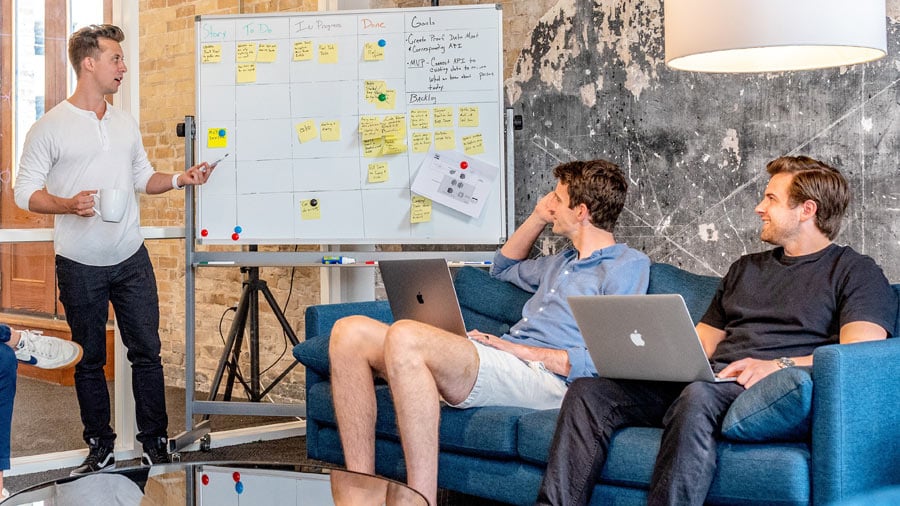When imagining a legal professional at work, most of us picture a courtroom setting or spending countless hours compiling legal documentation and liaising with clients. Unfortunately, the latter represents a serious problem for the legal sector as a whole. Smart, highly-paid professionals are spending hundreds of hours on simple administrative tasks thanks to old, inefficient, or manual processes.
Leaders in the legal sector are using digital transformation to turn problematic business processes into highly efficient and effective parts of their organizations. However, getting it right requires more than just technology as legal processes are notoriously complex and difficult to optimize from within IT. Simply put, IT professionals don’t know the ins and outs of what a legal professional actually needs from a tool.
How knowledge drives LegalTech
When it comes to playing the long game, digital transformation is a must, and no-code enables everyone in an organization to contribute to process improvements or new propositions for clients using their professional experience. This is extremely important for the legal industry, as removing the technical barriers of development means a legal professional can spark innovation without code getting in the way of the thinking process.
Of course, it’s a new way of doing things, which means the responsibilities of IT and non-IT are going to change. In a digitally-driven world, it can be scary to take on. But with clearly defined roles, no-code is quick, easy, and fast to adopt across an organization with minimal impact on employees themselves. This begs the question of who does what and what’s expected of each person to create impactful process optimization and new business propositions?
Will lawyers and litigators spark powerful ideas for propositions with the right tools?
No-code ensures that legal professionals or even other departments like Marketing and Knowledge can, and are encouraged to, join forces with IT to make a significant difference in their role. Nobody understands the frustrations of an organization better than the person without a well-suited tool to support them. A legal professional armed with a no-code platform can formulate their needs into workable prototypes within a few days.
With guidance from IT, application concepts like user stories and workflows should be worked through together to streamline how a citizen developer’s solution functions. All of this is done through the visual builder in Betty Blocks’ no-code platform, meaning there’s still no coding knowledge required to develop a Minimum Viable Product (MVP).
The role of legal professionals (citizen developers):
- Identify needs from within the business
- Collaborate with IT to formulate user stories
- Focus on getting a workflow into a digital format
- Ensure legal processes, forms, legislation, and rules are accounted for at all stages of development

Can Innovation or Business Development and Marketing build and expand applications themselves?
Citizen developers are able to conceptualize the vast majority of a functional application quickly but for highly-paid lawyers, their skills are better put to use in the ideation of applications, rather than building a finished product. Similarly, IT departments have their own projects to focus on which is where the no-coder role comes in.
A no-coder could be any tech-savvy employee from any department making it extremely easy to find people who fit the role perfectly. Consider your innovation department specifically to fill this role as their knowledge of consumer needs and trends across the industry will allow them to flesh out applications with targeted features.
They are platform users with a basic understanding of development best practices and can use their knowledge to flesh out the foundations that your citizen developers have put together. Using minimal (or even no-)coding, they build out a minimum viable product, adding functionality to solutions and connecting essential data to make the application work along with adding custom branding or business logic.
The role of the no-coder:
- Connect with crucial business data
- Align business and IT concepts
- Include additional functionality through actions
- Build dynamic features like forms or document automation
- Apply branding and custom business rules
Are professional coders needed in creating new legal propositions and streamlining processes?
Last but not least, your professional coders have two vital functions in digital transformation with citizen developers. With the roles outlined above, citizen developers and no-coders are capable of building entire applications but it’s important for IT to be aware of all their activity to protect a law firm’s tech-stack and data. This is why IT professionals should always fulfill a governance role with no-code by sanctioning tools, users, data connections, and ensuring projects adhere to organizational best-practices.
IT supports no-coders and citizen developers when needed with an ‘escape hatch’ available for them to customize every component of an application using a variety of coding languages or methods. The escape hatch is there to make sure you never get stuck in the development process. This is especially useful when an application built by the other two roles starts scaling organization-wide allowing IT to take it over without having to rebuild anything along the way.
With IT’s professional guidance and a final approval done, you can rest assured that any client facing propositions, process improvements, or automation will meet not only security standards but be 100% ready for stable deployment.
The role of pro-coders and IT professionals:
- Monitor and guide the other roles
- Ensure projects and solutions meet security and business standards
- Build advanced features using code where necessary
- Sanction API’s and govern platform usage through user roles

Build your own legal case with no-code
Both the speed of development and ease of use of no-code platforms make the above roles extremely flexible with the various tasks able to shift dynamically between each type of developer. Regardless of how you choose to do it, a collaborative strategy like we’ve outlined above will dramatically increase the speed at which a law firm can modernize problematic processes and win over clientele (existing or new) with innovative new propositions.
Given time and training, strategic use of no-code throughout your law firm is all but guaranteed to improve daily processes across the organization with only a minor change in how each of your employee’s role functions.
Of course, seeing is believing so if you’re a lawyer, LegalTech, or work in an IT department at a law firm, we’d love to show you exactly how the platform works in a 30 minute personalized demo. Get in touch with our fully focused legal team if you’d like to arrange a call where we’ll walk you through how everything we’ve talked about here works and get to know how other well-known law firms benefit on these changing ways of working.



